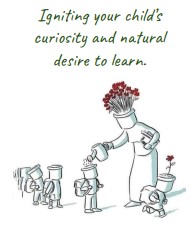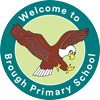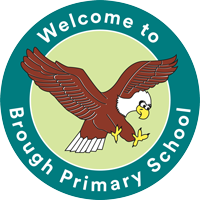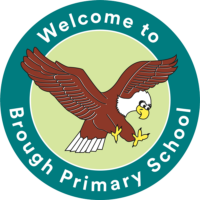In Brough Primary School’s Foundation Stage, we strive to put you and your child at the heart of everything we do; we believe children come first and that they deserve respect, trust and kindness. We aim to ensure that every day is full of purposeful learning and curiosity and that the children leave school with a spring in their step and a huge smile on their face.
Children at Brough Primary begin their school journey supported by knowledgeable educators who will encourage them to construct their own identities and understanding of the world through positive learning environments whilst developing their knowledge and skills in many areas of learning. Staff are regularly involved in updating and expanding their knowledge of the early years curriculum and the safeguarding measures that we have in place at our school.

We adapt our approaches
Rather than focusing on one way to teach or one way that children learn, we see the larger picture. We know that different approaches are necessary for different children. Varying learning activities allows for each child to have a chance at absorbing material in a way that works for them.
We have high expectations for all children. For children with particular needs, such as those with SEND, their curriculum is still ambitious and strives to meet their personal needs. We understand that all children are unique and we celebrate each and every child.
We aim to provide a learning experience that is bespoke to every unique EYFS cohort, based on the children’s needs identified at baseline, emerging trends and our continual monitoring and analysis that supports our planning and provision. Each child has their individual starting points which we value and recognise and we strive to support all children in becoming successful learners who are fully prepared for the next stage of their education as they transition from EYFS to Year One.
We effectively plan and design an early years curriculum that not only meets the emerging needs of the children but also supports, extends and develops curiosity and engagement and offers opportunities to work and learn in different ways.
Long term plans are frequently revised to ensure that they are well sequenced and progressive. Our planning is responsive and flexible, ensuring that we cater to emerging needs, interests and fascinations.
Practitioners share information with parents/carers about their child’s progress in relation to the EYFS using online journal ‘Tapestry’ where parents and carers are encouraged to contribute towards their child’s learning by supporting and extending their children’s interests.
Developing children’s strong sense of identity and well-being is something that we are really passionate about; we value a holistic perspective of learning and believe in developing the whole child. This is done in many different ways such as:
- teaching them mindfulness skills
- daily music, storytelling and art activities
- building independence and resilience
- promoting curiosity
- encouraging them to share their thoughts and feelings
- encouraging them to celebrate special times and individual goals and achievements with us
We aim to help children to make sense of the world around them, to develop tolerance, compassion and an understanding of their rights and the rights of others in an ever evolving world.
The EYFS Curriculum
The curriculum is split up into seven sections, which we cover throughout the year:
- Personal, Social and Emotional Development which encourages children’s understanding of and respect for themselves and others, their confidence in building relationships and managing their own feelings and behaviour.
- Physical Development which encourages children to develop gross and fine motor skills as well as developing their independence and confidence with managing their health and self-care needs.
- Communication and Language which develops their speaking, listening and understanding.
- Literacy which develops their reading, comprehension skills and reading.
- Mathematics which introduces them to numbers, counting, calculating, shape and pattern.
- Understanding of the World which introduces them to scientific, historical and geographical ideas.
- Expressive Arts and Design which focuses on their artistic, dramatic and musical skills.
The Development Matters document along with the Early Years Statutory Framework set out end of reception year expectations for children by the end of the Foundation Stage.
Phonics
Little Wandle is the name of the phonics scheme that we use at Brough Primary School.

We have been really impressed with the progress the children have made using the Little Wandle phonics programme. It uses a very clear and systematic approach which is predictable for the children and simple to follow. The children leave EYFS with such confidence and knowledge in their reading and writing skills and this gives them enormous help when starting their KS1 curriculum.
USEFUL LINKS
BBC Bitesize have a great website with lots of informative support and resource materials for you and your child starting school:
https://www.bbc.co.uk/bitesize/collections/starting-primary-school/1
Hungry Little Minds is a Department of Education led campaign that encourages parents and carers to adopt positive activities and behaviours to boost children’s communication, language and literacy development.
https://hungrylittleminds.campaign.gov.uk/
Take a look at the link below, the poster has some great suggestions for helping your child to be school ready!
The road to school
School Ready Poem
Alphabet Phonics Song:
https://www.youtube.com/watch?v=5PmB3SIjNdQ
School uniform link:
https://steadyschoolwear.co.uk/
Tips for Preparing your Child for School
As parents you are important educators to your child. There are many ways that you can help prepare your child for this new exciting experience:
- Encourage your child to be independent – Let them go to the toilet, feed, dress and fasten their shoes and coat by themselves.
- Sing songs and read stories – Sing nursery rhymes and number songs as often as you can and make listening to a story part of your daily routine.
- Try and bring Maths into everyday life – Counting steps to bed, spotting shapes and patterns for example.
- Sharing – Help your child to become familiar with sharing/taking turns and interacting with others.
- Help them to recognise their name and name writing – This will help with hanging coats, self-registration and taking ownership of their artwork.
- Practise with their lunch box – Such as opening wrappers and packets and eating food in the correct order.
Please click on the links below to access information about our foundation curriculum:








